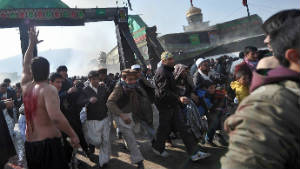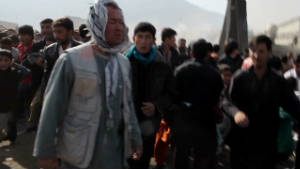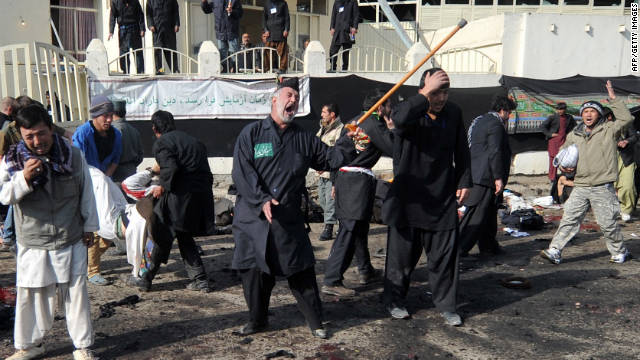Feed: CNN.com - WORLD
Posted on: Wednesday, December 07, 2011 2:11 PM
Author: CNN.com - WORLD
Subject: Rare Kabul attack: Who did it and why?
Tuesday's deadly suicide attack targeting Afghan Shia just didn't fit the pattern of what had come before in this troubled country. |
Rare Kabul attack: Who did it and why?
- Tuesday's deadly suicide attack didn't fit pattern of what had come before
- Mass casualty attacks are rare now: insurgents prefer to hit strategic targets
- Interior ministry points its finger at Taliban, despite an effusive denial
- Many Afghans place blame at one source: Pakistan
(CNN) -- Tuesday's deadly suicide attack targeting Afghan Shia just didn't fit the pattern of what had come before in this troubled country.
The police formed the usual cordon at the attack site -- this time a shrine in Kabul. Sirens pierced the odd moment of eerie silence, but the police chief's face was contorted with fury and confusion, like he'd seen something new and troubling -- even after decades of conflict here.
Yes, the insurgency has specialized in hitting targets right in the city center, often meters away from key institutions. Yes, they are aimed for effect.
But mass casualty attacks like we used to see in 2009 are rare these days. The insurgents prefer to hit strategic targets -- unless their roadside bombs are maiming civilians elsewhere.
And no, the Shia simply weren't targets before. Sectarianism was seldom an issue here: Afghanistan has lacked the Sunni-Shia divide in Iraq that helped to keep Saddam in power but made his fall so bloody.
 Uncommon attacks target Shiite Muslims
Uncommon attacks target Shiite Muslims  Video shows moment of Kabul blast
Video shows moment of Kabul blast It has been spared the brand of Sunni extremism in Pakistan, where ruthless attacks on Shia are a shocking part of the fabric.
The question of who did it was quickly answered but unsatisfactorily.
The interior ministry here points its finger at the Taliban, despite an effusive denial from spokesman Zabiullah Mujahid.
It's arguable that an offshoot of the Lashkar-e-Janghvi movement, which reportedly rang in a claim from Pakistan, is capable of mounting a sophisticated, targeted and vicious attack in the very heart of Kabul without some assistance.
If they are responsible, it does require some explanation as to how a small, rogue group of extremists -- which has links to al Qaeda and the Pakistan Taliban -- could suddenly develop the capacity to penetrate the capital of a neighboring state. And are Pakistani extremists really operating freely inside Afghanistan now?
Whether the culprits turn out to be the Pakistan-based Haqqani network -- the group blamed for recent high-profile and sophisticated attacks in the capital -- the Lashkar-e-Janghvi al Almi, or another complex part of Afghanistan's insurgency, fractured and complicated after 10 years, many Afghans place the blame at one source: Pakistan.
That's the "address" that Kabul thinks the Taliban now resides under. That's who they blame for most of the ills here, despite simultaneously hoping they will come to the negotiating table and help.
But we should not rush to attribute blame for one reason: The advent of Pakistani extremists trying to foment sectarian violence in Afghanistan at this late stage in the war is a prospect too terrifying to behold.
Most Popular
Loading weather data ...













No comments:
Post a Comment